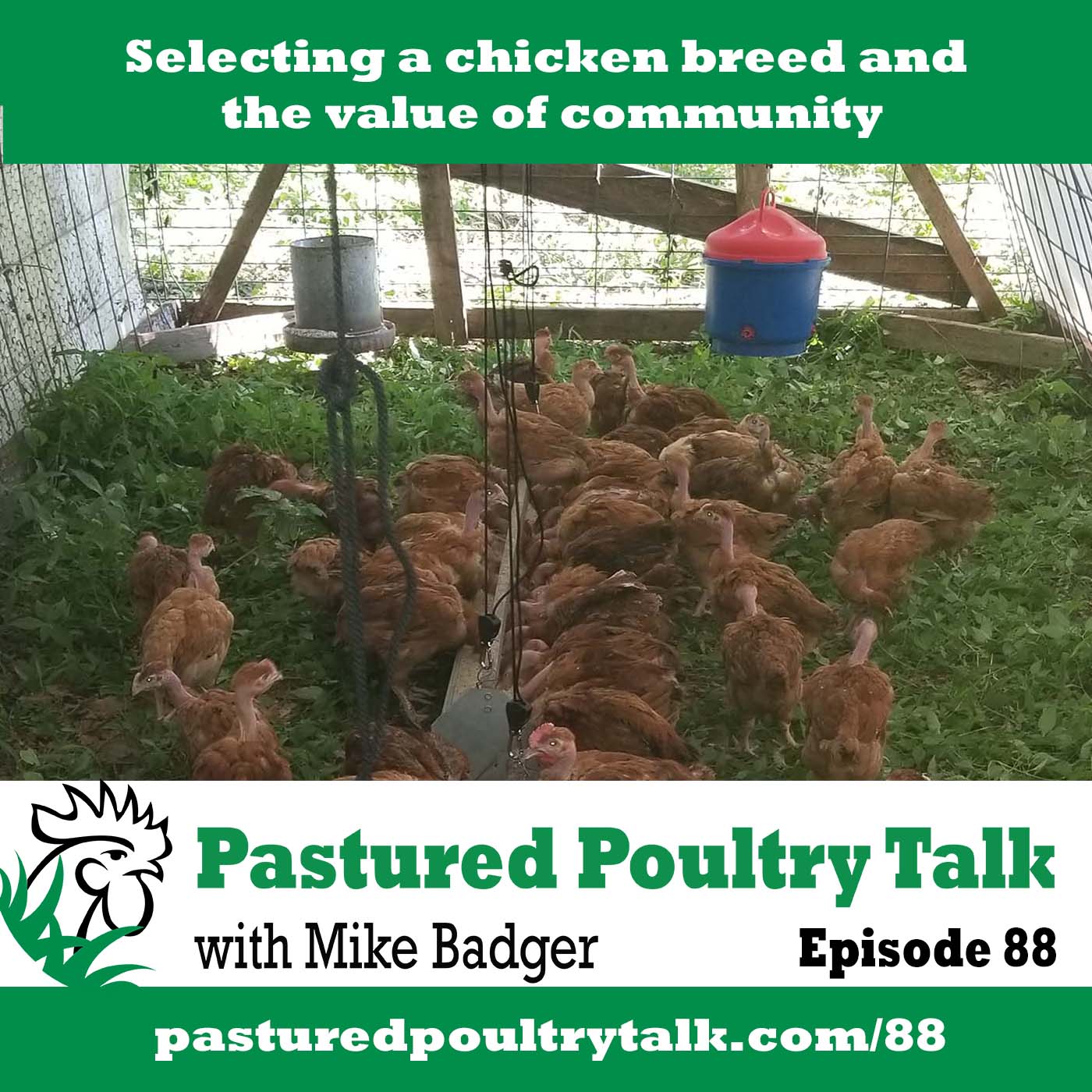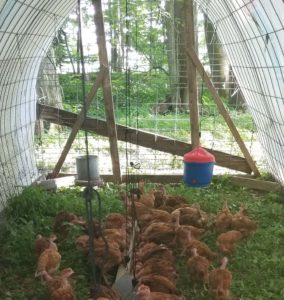
[podcast src=”https://html5-player.libsyn.com/embed/episode/id/10405424/height/90/theme/custom/thumbnail/yes/direction/forward/render-playlist/no/custom-color/88AA3C/” height=”90″ width=”100%” placement=”top” theme=”custom”]In episode 87 of Pastured Poultry Talk, I talked with Erin Angulo about her Delaware chicken breeding success and the formation of a new association designed to help breeders learn. I’m taking this opportunity to follow up with my own thoughts on Erin’s interview.

SASSO Naked Neck meat birds growing on pasture at Badger’s Millside Farm.
Erin mentioned the need to evaluate your needs in terms of selecting the right bird for your circumstances, and that’s a really basic need for pastured poultry producers of any type. The chicken you choose dictates what type of pastured poultry farm you will be. If your intent is to scale up and be a production farm focused on reaching the maximum number of people as possible, the Cornish Cross is your primary choice. That’s just the way it is.
In episode 44 of The Fighting Farmer podcast, Spence talked about the choice between production capacity, market demand, and what that meant for heritage versus hybrid. He’s all in on the Cornish cross, much like other scaled up, full-time pastured producers. However, that doesn’t mean he hates standard breeds like the Delaware. Too often people go into heritage breeds without a full grasp on the reality of their situations.
If you go the heritage chicken route, you have a different market, different experience, and a much small smaller scale. As I share in this episode, I think heritage poultry fills a specific need inside the pastured poultry community, but we need breeders like Erin to make improvements that give growers an advantage.
That’s why I wanted to showcase Erin’s work. She’s an example of a heritage meat chicken producer who is going in the right direction, and the question I always ask when I share her progress is, “are you willing to put forth that effort in your own breeding program?”
For my part in the breed selection, I’ve largely left the Cornish Cross behind. I’m not opposed to them. I think most of the problems growers face with the CX could be solved with a mirror. But I’ve crossed over to a slower growing hybrid. I’m sweet on the SASSO Naked Neck from So Big Farms. Though I’m not sure how long those birds will be around. John needs demand to keep his breeding program current. It’s not easy importing breeding stock from France.
In episode 87, Erin touched on the fickle demand. On one hand we need heritage poultry breeders to be able to supply some scale to their growers; on the other, we need growers to demand reliable supply from the breeders. Erin told me off interview that she’s charging $10 per chick. That’s nearly 7x the price of a hybrid chick. Price in chickens is always affected by scale, and it’s clear we don’t have enough demand to bring the per chick price down. As a grower, I find that initial investment tough to be competitive if all I want to do is raise chickens for a consumer market.
That’s where I think Heritage Poultry Breeders come in. This group is founded by people I personally trust, and I believe their commitment to help people become better breeders is an important step. By making breeding information more widely available, we can get more people improving their poultry lines in documented ways quicker. Even though this association is separate from SPN, I don’t want to lose sight of Jim Adkin’s work. Two of the earliest and popular episodes on this podcast feature Jim. He’s clear in his enthusiasm for his work, and I personally think he disrupted the heritage poultry space enough to refocus the heritage poultry community.
I think HPB offers a great entry point for breeders in a way that other organizations don’t. I’d like to see all these related associations ultimately unite their niches through friendly relationships and collaboration to create a broad and deep community to disrupt the current approach to chicken. There’s room for hybrids, heritage, educators, advocates, mentors, missionaries, and pastured producers.
Resources from the Episode
These Pastured Poultry Talk episodes were mentioned:
PPT013: Not A BackYard Chicken Club: Jim Adkins Interview Part 1
